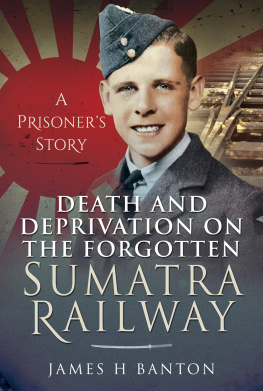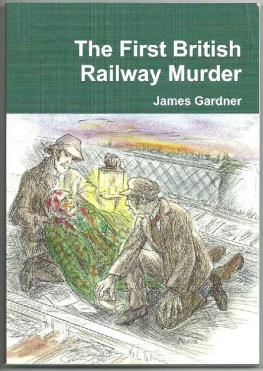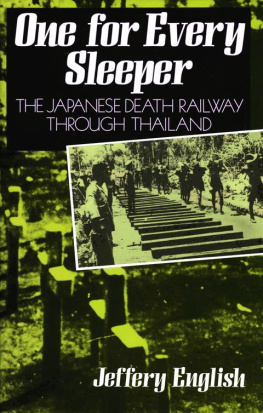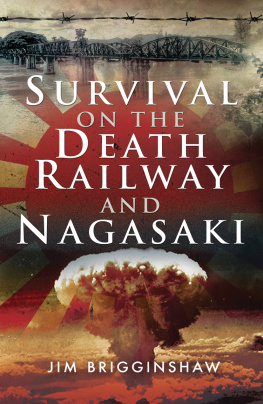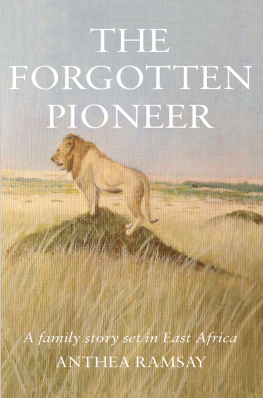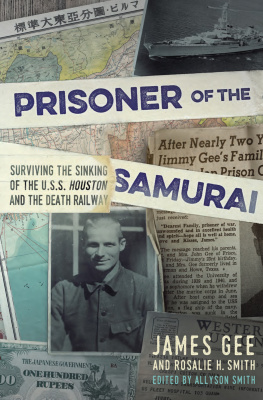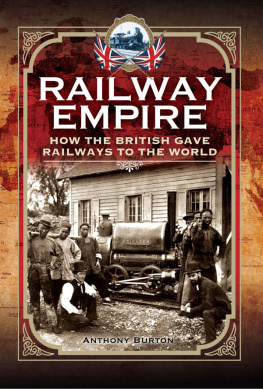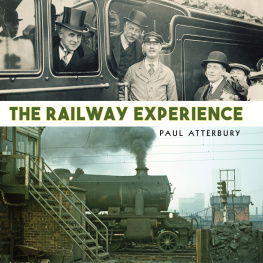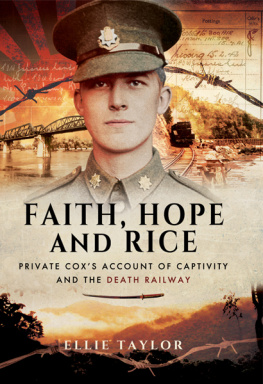
Death and Deprivation on the Forgotten Sumatra Railway
Death and Deprivation on the Forgotten Sumatra Railway
A Prisoners Story
James H. Banton
First published in Great Britain in 2021 by
Pen & Sword Military
An imprint of
Pen & Sword Books Ltd
Yorkshire Philadelphia
Copyright K.M. Banton 2021
ISBN 978 1 39900 649 1
eISBN 978 1 39900 650 7
Mobi ISBN 978 1 39900 650 7
The right of James H. Banton to be identified as Author of this work has been asserted by him in accordance with the Copyright, Designs and Patents Act 1988.
A CIP catalogue record for this book is available from the British Library.
All rights reserved. No part of this book may be reproduced or transmitted in any form or by any means, electronic or mechanical including photocopying, recording or by any information storage and retrieval system, without permission from the Publisher in writing.
Pen & Sword Books Limited incorporates the imprints of Atlas, Archaeology, Aviation, Discovery, Family History, Fiction, History, Maritime, Military, Military Classics, Politics, Select, Transport, True Crime, Air World, Frontline Publishing, Leo Cooper, Remember When, Seaforth Publishing, The Praetorian Press, Wharncliffe Local History, Wharncliffe Transport, Wharncliffe True Crime and White Owl.
For a complete list of Pen & Sword titles please contact
PEN & SWORD BOOKS LIMITED
47 Church Street, Barnsley, South Yorkshire, S70 2AS, England
E-mail:
Website: www.pen-and-sword.co.uk
Or
PEN AND SWORD BOOKS
1950 Lawrence Rd, Havertown, PA 19083, USA
E-mail:
Website: www.penandswordbooks.com
Preface
I t is 1988. I am in my 69th year and my wife Dorothy is in her 67th year. At the request and prompting of Keith, the youngest of our four children, I, with Dorothys help, will attempt to compile as correctly and honestly as I can the events of our lifetime.
This will not be a chronological diary, as I will add to each chapter as and when memories return to either of us.
It will be the story of two teenagers who met entirely by chance, fell immediately in love and have shared the highs and lows of life of ordinary people. Having both in completely different circumstances survived when the odds were stacked against us, we are in the autumn of our lives, still in love and enjoying what we recognize as our bonus years.
Chapter 1
Early Days
I was born at No. 11 Victoria Street, Burton-on-Trent, Staffordshire, at 11.50am on Sunday, 6 June 1920 a timing which my father thought was perfect as he was able to go along to his local (The Lord Napier), which was then at No. 14 Victoria Street, to celebrate when they opened at noon on Sundays.
My father was one Ebenezer Banton and my mother was, prior to marriage, Elsie May Key.
I only knew one of my grandparents, on my mothers side, who was in her second marriage and was Elizabeth Chambers.
My mother had three brothers: Bill, Syd and Albert. Their father died when they were small children after suffering for some years as a result of an accident involving some Bass horses outside the Midland Hotel in Station Street. This had a large effect on my youth, as you will read later.
Bill gave a false age during the First World War and was driving lorries in France before he was 17 years old. He married Elsie Fitzjohn and they had one son, Bill, who when aged about 23 walked out of his widowed mothers house one day and was never heard of again.
Syd Key spent his whole life on the railway and moved to Normanton, Yorkshire, to advance from fireman to driver. He had two sons, Sydney and Peter, and lived to be about 70 years of age, leaving his wife Eadie (formerly Robinson) who died in 1984 at about 80 years of age.
Albert, the youngest (who introduced me to football), worked in the breweries until his death in his early 1960s. His widow Ethel (ne Pratt from Bond Street) still lives in Branstone Road and has two sons, Bill and Brian, and two daughters, Eileen and Christine.
I never learned anything of my fathers parents, and the reason for this was only recently made clear to me by my cousin, Richard Banton. It was the custom at that time (the turn of the twentieth century) that when children became 13 or 14 years of age they were forced to fend for themselves. This being the case, boys went mainly to farm service and girls into domestic service, and thus families disintegrated. Travel was scarce and the majority of parents could barely read or write adequately, so contacts were lost.
My father often told me how at the Statutes Fair, farmers from the outlying districts would come to hire hands. They would meet youths wanting work and would hire them at about 20 per year plus keep (such as it was), and the deal was sealed by the payment to the hand of one shilling (5p).
The young men (as did the girls in domestic service) would equip themselves with a large metal trunk, secured by a padlock, in which they would keep all their worldly belongings. Two of these (my mothers and my fathers) were at our home and used as blanket chests. One was disposed of with rubbish when Kathleen left the Swan Hotel as landlady in the 1970s.
My father had two brothers of whom I knew, Samuel Henry and Frederick. Frederick, who lost an arm in the First Word War, worked as a railway guard. He died of cancer in Nottingham, leaving his wife Emmie with three small children: Jackie, Norman and Dennis. The last I knew of these (in about 1960), they were living in Oxford; Jack and Norman were working at Morris Motors and Dennis was the cricket coach to the University and playing in Minor Counties cricket.
Samuel Henry and his wife Elsie (ne Jones, from Short Street, Stapenhill) had three sons Raymond, Cecil and Richard and one daughter, Edna.
Uncle Sam only had one eye, and on six days a week would leave the Co-op bakery in Byrkerley Street with his horse and van to deliver bread and cakes around Stanton, Newhall and district in all weathers. He retired after suffering an injury to a leg, and with his compensation became landlord of The Lord of Napier in Victoria Street. Cecil died in 1985, and Ray (Isle of Man), Richard (Wales) and Edna (Shropshire) have all left the home town.
My father went off into farm service somewhere in the district of Tunstall and Rangemore, while my mother (they had still not met at this stage) went into domestic service.
My mother went first to work at a boys school at Rocester and later was house assistant at Denstone College near Uttoxeter. I remember Mother telling me how at 15 and 16 years old she would have to work from 5am until 10 or 11pm. The boys would come in after playing rugger, and as well as other chores she would be required to wash, dry and iron all their kit ready for the next day no washing machines in those days; only human ones!
When she was a little older, Mother became a cook and later worked for Michael Sadler, a very highly respected vet who had his house and stables in Lichfield Street. The house still stands near the corner of Bond Street, opposite the entrance to Peel Croft.
In 1912, Father began work in the cooperage department of Samuel Allsopps brewery, which later became Ind Coope Allsopp and is now Allied Breweries. It was about this time that a friend of his by the name of Ian Mansfield (whose cobblers shop still operates in High Street opposite the Bass Brewery offices) introduced him to my mother.
Next page
